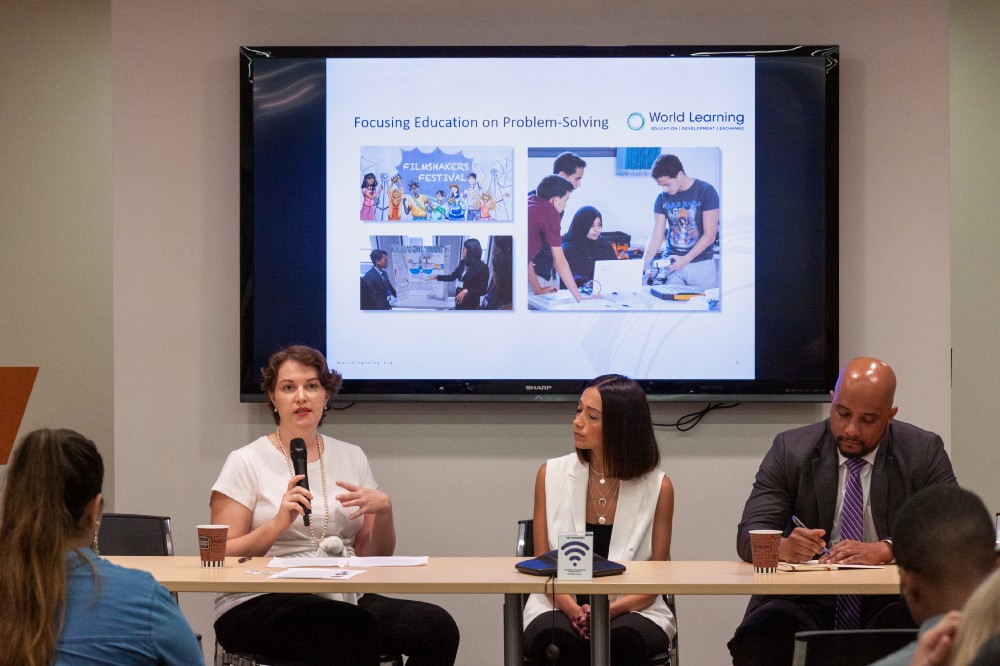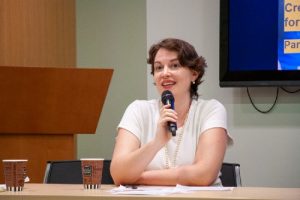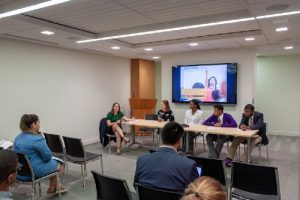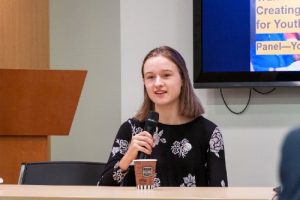-
What We Do
- WHERE WE WORK
-
About Us
 Welcome Message from Carol Jenkins
Welcome Message from Carol JenkinsFor more than 90 years, World Learning has equipped individuals and institutions to address the world’s most pressing problems. We believe that, working together with our partners, we can change this world for the better.
On my travels, I’ve had the opportunity to meet with many of those who have joined us in this mission. In Baghdad, we’ve trained more than 2,300 Iraqi youth who are already giving back at home. In London, our partners in the TAAP Initiative strongly believe that we are all responsible to practice inclusion. And in Vermont, our Experiment in International Living and School for International Training participants prove every day that they have the tools and the determination to change the world.
Please join us in our pursuit of a more peaceful and just world.
- Get Involved
Media Center > Story
How Focusing on Problem-Solving Could Transform Education
August 20, 2019

Dr. Catherine Honeyman, World Learning’s senior youth workforce specialist, believes education systems around the world need to think beyond grades, exams, and even career training, and instead focus on a problem-solving approach that will prepare students to confront the world’s challenges.
“[Students] have to know how to seek information for themselves,” she said during an August 9 event celebrating International Youth Day. “They have to know how to see what in the world needs changing and do something about it.”
The event, hosted by Banyan Global, focused on the 2019 International Youth Day theme, Transforming Education, and included expert and youth panel discussions about the ways in which education is adapting to meet the ever-changing needs of young people and the workforce. Mia Lazar, a high school student and alumna of World Learning’s Digital Young Leaders Exchange Program (DYLEP), also took part in the event as a speaker on the youth panel.
During the expert panel, Honeyman shared the stage with Dr. Jacqueline Fernandez-Romero, principal of the Latin American Youth Center (LAYC) Career Academy Public Charter School, and Dr. Benjamin Williams, principal of Ron Brown College Preparatory High School.
The panelists discussed how their organizations are finding new ways to support students, help them stay in the classroom, and better prepare them for life after school.

Honeyman explained that World Learning is helping education systems and individuals adopt a problem-solving approach to education by promoting three key concepts: design-focused STEM education, which helps students understand how science and technology can be used to address real-world problems; education for social responsibility, which focuses on ways youth can help address current pressing needs in their communities and the world; and — to support both of these areas — independent learning and information literacy, which ensures students know how to access information, critically analyze it, and learn from it on their own.
She highlighted one example of this in World Learning’s collaboration with the Egyptian Ministry of Education to set up a network of public high schools focused on science, technology, engineering, and mathematics (STEM). These schools employed a project-based curriculum in which students collaborated to find solutions to some of the country’s “grand challenges,” which included issues related to pollution, desertification, and employment.
“For us, it’s really about making sure that young people know they have the capacity to solve these problems and that that is the purpose of their education,” Honeyman said.
The conversation on both panels also emphasized the importance of giving students a voice in their education. Lazar and the other speakers on the youth panel, Maurice Moore and Donovan Strong, both students at Ron Brown High School, and Imani Strong, a student at LAYC Career Academy, said they would like to see more opportunities in school for young people to express themselves and focus on issues they are passionate about.

As a DYLEP participant, Lazar engaged with other high school students from across Iraq and the U.S. through videos, discussion forums, online chats, webinars, and games. The virtual exchange also included small group dialogue sessions during which participants talked about a wide range of topics including their hopes and fears, cultural norms and expectations, and stereotypes and bias. Lazar said having an opportunity to discuss her views with peers from different communities was a key element of the program.
“I wanted to have a place where I could meet new people and share ideas, but also have a chance to share my opinions and become a stronger leader,” she said.
Lazar is also a passionate about expressing herself though documentary filmmaking and received a DYLEP Fellowship to support the youth film festival she is organizing as her follow-in project. The fellowship aims to empower DYLEP alumni to serve their communities by providing grants of up to $5,000 to carry out an innovative action project and is funded with the help of the Putnam Foundation and World Learning board member Rosamond Delori. Lazar’s project, the Filmshakers Festival, will showcase films by high school and colleges students that focus on themes of peacebuilding and anti-bigotry.

“It was inspired by World Learning,” she said of the festival. “World Learning is about giving youth a voice and I felt like I could give more youth a voice through film.”
Honeyman said she believes education systems should become more flexible so that, like Lazar, students can hone their unique abilities and discover how they can contribute to their communities and the world.
“Our youth have shown us that our education systems have to make space for them to show their talents,” she said.
Honeyman concluded that she would like everyone within the education system, including policymakers, school principals, teachers, and students, “to be able to give a more convincing answer to the question ‘Why should I learn this?’”
“There must be a purpose that they understand and that has meaning for them,” Honeyman said.
Students from World Learning’s STEM Centers in Algeria may have provided some of the best advice on instilling a sense of purpose into their schooling: explain how they can use their education to help others by finding solutions to real world problems.
“We like practical mysteries,” Honeyman recalled the students saying. “Don’t start with information. Start with the question. Start with the question that I’m interested in but can’t answer until you teach me something.”





